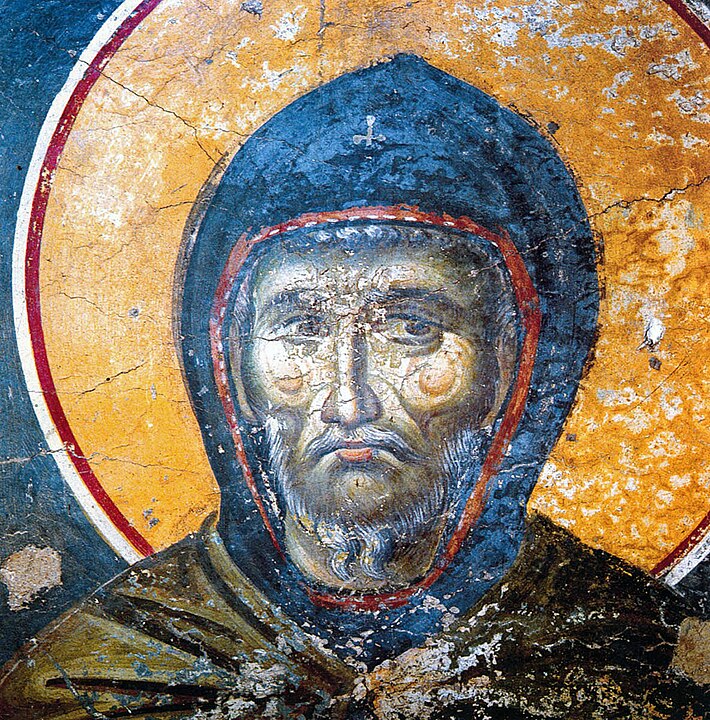Saint Ephrem
Feast Day: June 8
Saint Ephrem’s life was filled with good works, preaching and writing, for he also had great gifts of poetry and written discourse. Much of his holiness is magnified through his sadness of the sins of others and himself. Saint Ephrem became a deacon after travelling to Edessa and he became one of the first to bring music into the Church’s public worship as a way for instruction.
He was declared a Doctor of the Church in the Catholic Church in 1920.
Many wonderful lessons can be derived from the life of this Saint, known in particular for his unfailing and remarkable humility. Born at Nisibe in Syria, his forebears were poor folk, and he as a child tended the herds in the fields. Saint Ephrem would be baptized only as a young adult.
One day, while still an adolescent, he pursued the only cow of a neighbor, throwing stones at the poor beast to see it run, until it fell exhausted and died. To add to his fault, he denied having seen the animal when its owner came to look for it. All his life he wept over this double prevarication, and later he related to the religious who were his followers how he was punished for it: About a month later, he was with a shepherd who drank too much one evening, and through neglect lost the sheep of the owner’s flock when wolves entered into the fold. Ephrem was taken to prison with the shepherd and confined there. From the stories his companions there narrated, he realized that they too were detained for crimes not committed, but that they had committed others which had remained unpunished. Recognizing in these facts the effects of Divine Justice, he was warned to do penance by a severe Angel who appeared to him several times, helping him also to accept his chastisement. He was released after two months, but never forgot the lessons in humility he had received.
Never did Saint Ephrem think of himself as anything other than a great sinner; we can read in his various writings his self-accusations and his confessions. He had the gift of tears and for years he wept, literally without ceasing, according to the testimony of Saint Gregory of Nyssa, who wrote: At times he was weeping over the sins of men, and again over his own. His sighs succeeded his tears, and then brought them forth again. It was also said that the tears he shed so profusely, instead of disfiguring his face, seemed to augment its serenity and grace; all who had seen or heard Saint Ephrem were inspired to venerate his holiness.
The death of Saint James of Nisibe and of another Saint who had lived in a cell near his own solitary dwelling, decided him to make a pilgrimage to Edessa, a very Christian city, to honor the relics of the Apostle Saint Thomas, venerated there. While in Edessa he was ordained a deacon and attached permanently to the church of Edessa, then obliged under obedience to preach. The ministry of preaching is not usually that of deacons, but his virtue and capacities were recognized at once. He had not studied and knew only his own language, but he had absorbed Holy Scripture and profited from his intelligence of it. It is he who wrote: “You do not understand all that you read there? If you were traveling and, being thirsty, came upon a spring of fresh water, would you be incensed because you could not drink all of it? No, you would be happy that, on another journey, the spring would still be there to quench your thirst.”
Patronage
Spiritual Leaders
Source: sanctoral.com

Birthplace
Born
AD 306
Nisibe, Syria (Turkey)
Death
9 June 373 (About Age 67)
Edessa, Turkey
Canonized
Pre-Congregation
Shrine/Relics/Tomb
–
Learn more:
Catholic Answers
St. Ephrem – CatholicNewsAgency.com
On June 9, the Roman Catholic Church honors Saint Ephrem of Syria, a deacon, hermit, and Doctor of the Church who made important contributions to the spirituality and theology of the Christian East during the fourth century…
Franciscan Media
Saint Ephrem – FranciscanMedia.org
Poet, teacher, orator, and defender of the faith, Ephrem is the only Syriac Christian recognized as a doctor of the Church. He took upon himself the special task of opposing the many false doctrines rampant at his time, always remaining a true and forceful defender of the Catholic Church…
